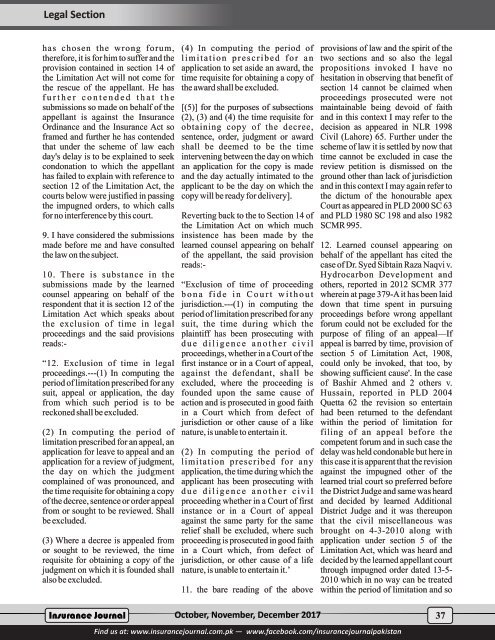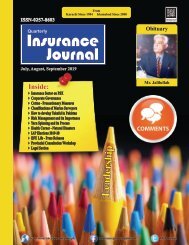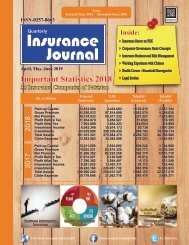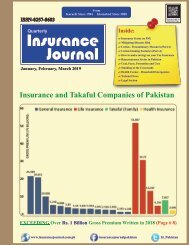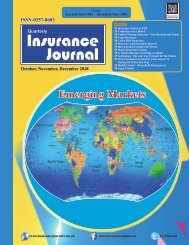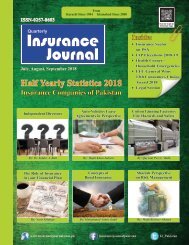Insurance Journal (4th Quarter 2017)
Create successful ePaper yourself
Turn your PDF publications into a flip-book with our unique Google optimized e-Paper software.
Legal Section<br />
has chosen the wrong forum,<br />
therefore, it is for him to suffer and the<br />
provision contained in section 14 of<br />
the Limitation Act will not come for<br />
the rescue of the appellant. He has<br />
f u r t h e r c o n t e n d e d t h a t t h e<br />
submissions so made on behalf of the<br />
appellant is against the <strong>Insurance</strong><br />
Ordinance and the <strong>Insurance</strong> Act so<br />
framed and further he has contended<br />
that under the scheme of law each<br />
day's delay is to be explained to seek<br />
condonation to which the appellant<br />
has failed to explain with reference to<br />
section 12 of the Limitation Act, the<br />
courts below were justified in passing<br />
the impugned orders, to which calls<br />
for no interference by this court.<br />
9. I have considered the submissions<br />
made before me and have consulted<br />
the law on the subject.<br />
10. There is substance in the<br />
submissions made by the learned<br />
counsel appearing on behalf of the<br />
respondent that it is section 12 of the<br />
Limitation Act which speaks about<br />
the exclusion of time in legal<br />
proceedings and the said provisions<br />
reads:-<br />
“12. Exclusion of time in legal<br />
proceedings.---(1) In computing the<br />
period of limitation prescribed for any<br />
suit, appeal or application, the day<br />
from which such period is to be<br />
reckoned shall be excluded.<br />
(2) In computing the period of<br />
limitation prescribed for an appeal, an<br />
application for leave to appeal and an<br />
application for a review of judgment,<br />
the day on which the judgment<br />
complained of was pronounced, and<br />
the time requisite for obtaining a copy<br />
of the decree, sentence or order appeal<br />
from or sought to be reviewed. Shall<br />
be excluded.<br />
(3) Where a decree is appealed from<br />
or sought to be reviewed, the time<br />
requisite for obtaining a copy of the<br />
judgment on which it is founded shall<br />
also be excluded.<br />
(4) In computing the period of<br />
l i m i t a t i o n p r e s c r i b e d f o r a n<br />
application to set aside an award, the<br />
time requisite for obtaining a copy of<br />
the award shall be excluded.<br />
[(5)] for the purposes of subsections<br />
(2), (3) and (4) the time requisite for<br />
obtaining copy of the decree,<br />
sentence, order, judgment or award<br />
shall be deemed to be the time<br />
intervening between the day on which<br />
an application for the copy is made<br />
and the day actually intimated to the<br />
applicant to be the day on which the<br />
copy will be ready for delivery].<br />
Reverting back to the to Section 14 of<br />
the Limitation Act on which much<br />
insistence has been made by the<br />
learned counsel appearing on behalf<br />
of the appellant, the said provision<br />
reads:-<br />
“Exclusion of time of proceeding<br />
b o n a f i d e i n C o u r t w i t h o u t<br />
jurisdiction.---(1) in computing the<br />
period of limitation prescribed for any<br />
suit, the time during which the<br />
plaintiff has been prosecuting with<br />
d u e d i l i g e n c e a n o t h e r c i v i l<br />
proceedings, whether in a Court of the<br />
first instance or in a Court of appeal,<br />
against the defendant, shall be<br />
excluded, where the proceeding is<br />
founded upon the same cause of<br />
action and is prosecuted in good faith<br />
in a Court which from defect of<br />
jurisdiction or other cause of a like<br />
nature, is unable to entertain it.<br />
(2) In computing the period of<br />
limitation prescribed for any<br />
application, the time during which the<br />
applicant has been prosecuting with<br />
d u e d i l i g e n c e a n o t h e r c i v i l<br />
proceeding whether in a Court of first<br />
instance or in a Court of appeal<br />
against the same party for the same<br />
relief shall be excluded, where such<br />
proceeding is prosecuted in good faith<br />
in a Court which, from defect of<br />
jurisdiction, or other cause of a life<br />
nature, is unable to entertain it.’<br />
11. the bare reading of the above<br />
provisions of law and the spirit of the<br />
two sections and so also the legal<br />
propositions invoked I have no<br />
hesitation in observing that benefit of<br />
section 14 cannot be claimed when<br />
proceedings prosecuted were not<br />
maintainable being devoid of faith<br />
and in this context I may refer to the<br />
decision as appeared in NLR 1998<br />
Civil (Lahore) 65. Further under the<br />
scheme of law it is settled by now that<br />
time cannot be excluded in case the<br />
review petition is dismissed on the<br />
ground other than lack of jurisdiction<br />
and in this context I may again refer to<br />
the dictum of the honourable apex<br />
Court as appeared in PLD 2000 SC 63<br />
and PLD 1980 SC 198 and also 1982<br />
SCMR 995.<br />
12. Learned counsel appearing on<br />
behalf of the appellant has cited the<br />
case of Dr. Syed Sibtain Raza Naqvi v.<br />
Hydrocarbon Development and<br />
others, reported in 2012 SCMR 377<br />
wherein at page 379-A it has been laid<br />
down that time spent in pursuing<br />
proceedings before wrong appellant<br />
forum could not be excluded for the<br />
purpose of filing of an appeal—If<br />
appeal is barred by time, provision of<br />
section 5 of Limitation Act, 1908,<br />
could only be invoked, that too, by<br />
showing sufficient cause'. In the case<br />
of Bashir Ahmed and 2 others v.<br />
Hussain, reported in PLD 2004<br />
Quetta 62 the revision so entertain<br />
had been returned to the defendant<br />
within the period of limitation for<br />
filing of an appeal before the<br />
competent forum and in such case the<br />
delay was held condonable but here in<br />
this case it is apparent that the revision<br />
against the impugned other of the<br />
learned trial court so preferred before<br />
the District Judge and same was heard<br />
and decided by learned Additional<br />
District Judge and it was thereupon<br />
that the civil miscellaneous was<br />
brought on 4-3-2010 along with<br />
application under section 5 of the<br />
Limitation Act, which was heard and<br />
decided by the learned appellant court<br />
through impugned order dated 13-5-<br />
2010 which in no way can be treated<br />
within the period of limitation and so<br />
<strong>Insurance</strong> <strong>Journal</strong> October, November, December <strong>2017</strong><br />
37<br />
Find us at: www.insurancejournal.com.pk — www.facebook.com/insurancejournalpakistan


